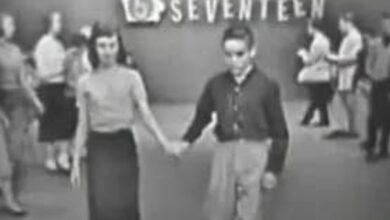Blueberry Hill by Fats Domino Honors Elvis, Starting with His Heartfelt Words That Moved Me to Tears
Fats Domino’s hit song “Blueberry Hill” is not only a timeless classic in the annals of rock and roll but also a poignant tribute to the legendary Elvis Presley. Released in 1956, the song quickly soared to success, becoming one of Fats Domino’s most iconic hits. It reached number two on the Billboard Top 100 chart, solidifying Domino’s place in music history. However, the song’s journey to becoming a classic started long before Fats Domino put his signature touch on it.
“Blueberry Hill” was written in 1940 by Vincent Rose, Al Lewis, and Larry Stock, a trio of songwriters who were well-known for their contributions to American popular music. The song was first recorded by the famous bandleader Glenn Miller and his orchestra in 1940. Miller’s version was a hit, but it was primarily within the big band genre. Over the next decade, the song was covered by several notable artists, including country singer Gene Autry and jazz legend Louis Armstrong. Each version added a different flavor to the song, but it wasn’t until Fats Domino’s rendition in 1956 that “Blueberry Hill” became a global sensation.
Fats Domino’s version of “Blueberry Hill” stood out for several reasons. First, his distinctive piano playing, coupled with his smooth, laid-back vocal style, gave the song a new dimension that resonated with a wide audience. The song’s simple yet catchy melody, combined with Domino’s soulful delivery, struck a chord with listeners, making it one of the defining songs of the early rock and roll era.
What truly makes Fats Domino’s rendition of “Blueberry Hill” unique, however, is the heartfelt introduction in which he pays tribute to Elvis Presley. Before launching into the song, Fats Domino would often say, “I found my thrill on Blueberry Hill, on that hill where I found you. The moon stood still on Blueberry Hill, and it lingered until my dreams came true.” He would then add, “You know, I heard that Elvis Presley likes this song pretty good. And I’d like to dedicate it to him.”
This introduction was more than just a casual remark; it was a deeply emotional moment that connected two of rock and roll’s greatest pioneers. Both Fats Domino and Elvis Presley were instrumental in shaping the sound of modern music, and their mutual respect for each other’s work was well-known. Elvis often cited Fats Domino as one of his biggest influences, referring to him as “the real king of rock and roll.” Fats, in turn, admired Elvis for his groundbreaking contributions to the genre and his ability to connect with audiences across racial and cultural lines.
The dedication of “Blueberry Hill” to Elvis Presley added a layer of significance to an already beloved song. For many fans, this gesture was a powerful reminder of the bond between these two musical legends. It also underscored the deep sense of camaraderie and mutual respect that existed among the early pioneers of rock and roll, who, despite their different backgrounds, shared a common passion for music.
The emotional impact of Fats Domino’s tribute to Elvis was profound. Fans who attended Fats Domino’s live performances often found themselves moved to tears by the sincerity and warmth of his dedication. It was a moment that transcended music, touching on the shared history and struggles of two artists who helped define an era.
In the broader context of Fats Domino’s career, “Blueberry Hill” represents more than just a hit song; it is a symbol of his enduring legacy as one of the true giants of rock and roll. Fats Domino’s ability to infuse his music with heart and soul, while also paying homage to his peers, is a testament to his character and his deep love for the art form.
Today, “Blueberry Hill” continues to be celebrated as one of the greatest songs in rock and roll history. Its timeless appeal, combined with the emotional weight of Fats Domino’s tribute to Elvis Presley, ensures that it will remain a cherished piece of music for generations to come. The song stands as a reminder of the power of music to bring people together, to honor those who came before, and to create lasting memories that resonate long after the final note has been played.





